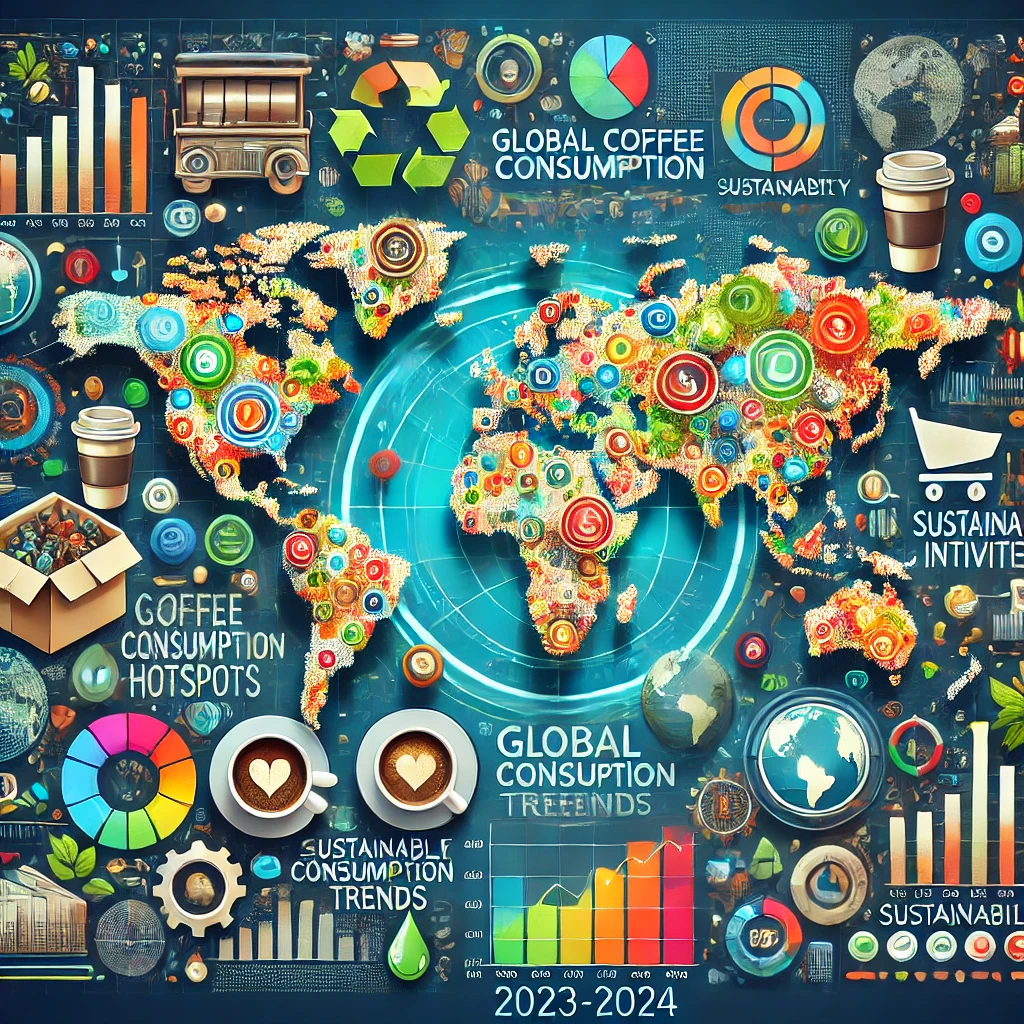Introduction
Coffee is one of the most widely consumed beverages worldwide, driving economies, shaping cultures, and spurring sustainability initiatives. Research shows that coffee consumption is increasing globally, with the United States leading consumption, while nations like Uganda, Ethiopia, and Brazil dominate coffee production and exports. This blog explores global coffee consumption trends, highlights key research insights, and emphasizes the growing role of sustainable practices, particularly recycling coffee waste into textiles and eco-friendly materials.
1. Global Coffee Consumption Trends
Leading Coffee-Consuming Nations
Research from the Global Coffee Consumption by Country report confirms the United States as the largest consumer of coffee globally in 2023. This trend is supported by a growing café culture and the popularity of specialty coffee.
- European Union: Nordic countries like Finland and Iceland show the highest per capita coffee consumption. The EU’s vibrant coffee culture, driven by cafes and specialty brews, sustains this high demand.
- Asia-Pacific Growth: Urbanization and western cultural influence drive coffee demand in nations like China, India, and Japan.
Global Market Insights
According to the Global Coffee Market Size and Forecast Report (2023), the coffee market was valued at $116.14 billion in 2023. Key trends include:
- Instant Coffee Dominance: Its convenience, affordability, and long shelf life make it a staple in many households.
- Digital Transformation: Online platforms and e-commerce subscriptions are redefining how consumers discover, purchase, and enjoy coffee.
2. Research Insights: Export Competitiveness and Sustainability
Export Leaders and Competitiveness
The study by Gois, T.C., Thomé, K.M., and Balogh, J.M. (2023) in Competitiveness Review highlights leading coffee-exporting nations.
- Nations like Uganda, Ethiopia, Honduras, Brazil, Colombia, Guatemala, and Indonesia show the highest Relative Symmetric Comparative Advantage (RSCA) values.
- Countries such as Italy, India, Mexico, and Switzerland also demonstrate strong survival rates in the coffee export market, reflecting their growing expertise since 2015.
Sustainability Opportunities
Increased global consumption opens opportunities to transform coffee waste into valuable products. Recycling coffee waste helps reduce landfill usage and supports eco-friendly innovations, such as coffee-based textiles and compostable materials.
3. Transforming Coffee Waste into Textiles
The Process
- Collection and Cleaning: Coffee grounds and husks are collected from roasters, cafes, and farms, then cleaned of impurities.
- Grinding and Fiber Extraction: Coffee husks are processed to extract fibers, while grounds are ground into fine particles for dyeing.
- Fabric Creation: Coffee fibers are spun into yarn and woven into textiles. Coffee grounds serve as natural dyes, producing brown and beige hues.
Benefits of Coffee-Based Textiles
- Odor Resistance: Coffee-infused fabrics neutralize odors.
- UV Protection: Provides protection against harmful sun rays.
- Eco-Friendly Production: Uses less energy compared to synthetic fabrics, reducing carbon emissions.
4. Sustainability Initiatives by Leading Coffee-Producing Nations
Exporting Countries’ Contributions
- Uganda and Ethiopia: Known for high-quality coffee beans, these nations lead sustainable farming and export practices.
- Brazil and Colombia: Major players in global coffee exports, these countries increasingly invest in recycling initiatives and sustainable production methods.
European Union’s Sustainability Leadership
The EU supports sustainable coffee production through policies like the Common Agricultural Policy. These initiatives promote eco-friendly practices, influencing coffee trade and consumption worldwide.
5. Marketing and Advertising Trends in Sustainable Coffee
Digital Transformation in the Coffee Market
- E-commerce platforms drive coffee sales, offering curated subscriptions and access to unique origins.
- Social media campaigns focus on sustainability, transparency, and direct consumer-producer relationships.
Consumer Preferences
Consumers increasingly prioritize sustainable products, supporting brands with eco-certifications and ethical sourcing practices. Transparency in supply chains is becoming a critical factor in purchasing decisions.
6. Challenges and Future Prospects
Challenges
- Infrastructure for Waste Recycling: Expanding global capacity for coffee waste recycling remains a key hurdle.
- Consumer Education: Raising awareness about sustainable practices and products is vital.
Future Prospects
Advancements in recycling technologies and the rising demand for eco-conscious products position coffee waste as a critical resource for industries like textiles, packaging, and biofuels.
Conclusion
The global coffee industry is evolving rapidly, fueled by increasing consumption and innovative sustainability practices. Research highlights opportunities to transform coffee waste into valuable products, addressing environmental challenges while creating economic benefits. By embracing sustainable practices, nations, businesses, and consumers can shape a greener future for the coffee industry.
References:
- PAPER: Gois, T.C., Thomé, K.M. and Balogh, J.M. (2023), “Behind a cup of coffee: international market structure and competitiveness”, Competitiveness Review, Vol. 33 No. 5, pp. 993-1009. https://doi.org/10.1108/CR-10-2021-0141.
- PAPER: Global Coffee Consumption by Country
- COFFEE CONSUMPTION figures (2023): Consumptions in US is highest, with overall consumption increase globally. This indicates increased opportunity to transform coffee waste into products and other useful materials reducing global waste and promoting sustainability.
- PAPER: Global Coffee Market Size and Forecast Report, 2023-2024 and 2030: Trends, Share, Growth, Insight, Impact of Inflation, Company Analysis – ResearchAndMarkets.com | Business Wire
Let’s turn every coffee bean—and its waste—into an opportunity for a sustainable future.


